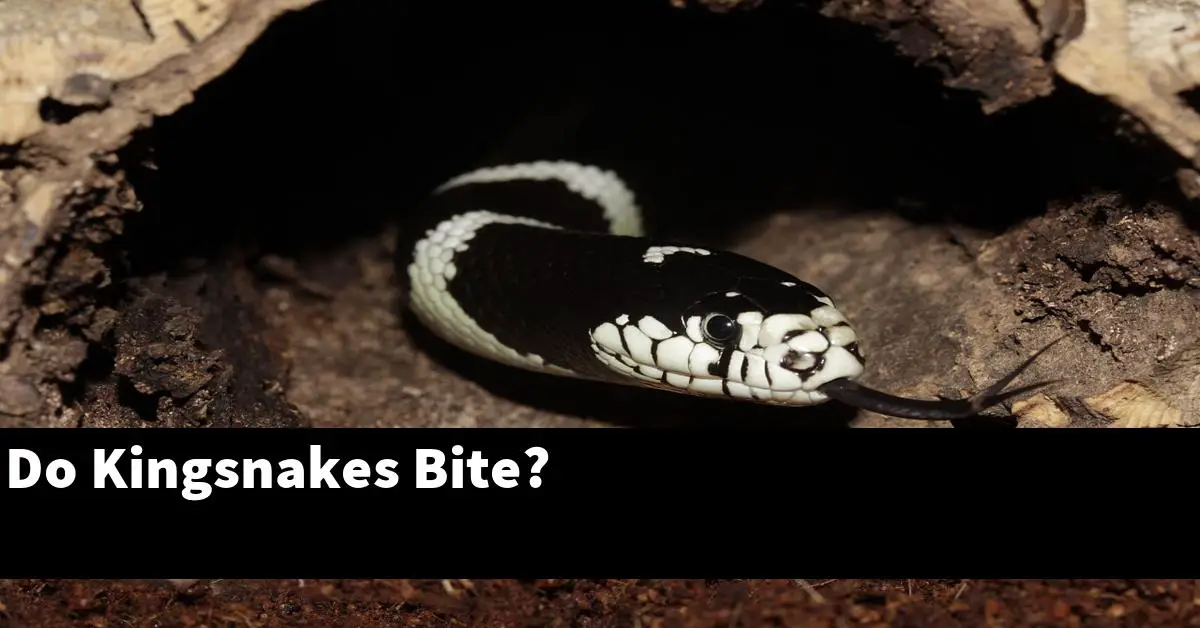Why do kingsnakes have such a bad reputation? Do they really deserve to be feared?
Yes, kingsnakes can bite, but they are not considered dangerous to humans. Their bites are not poisonous and typically only result in a small amount of bleeding.
The article will go on to discuss whether or not kingsnakes bite, and if they do, how dangerous it is.
Table of Contents
Does it hurt to be bitten by a king snake?
Yes, it can hurt to be bitten by a king snake. King snakes are nonvenomous, but their bites can still cause pain and swelling.
The severity of the bite depends on the size of the snake and how deep the bite is. King snakes have sharp teeth that can puncture the skin. If the bite is deep, it can cause bleeding and infection.
Do kingsnakes have venom?
There are many different species of kingsnake, and they are all non-venomous. The kingsnake is a constrictor, meaning that it kills its prey by wrapping its body around it and squeezing it until it suffocates.
While the kingsnake is not venomous, it does have two small fangs at the front of its mouth that it uses to deliver a mild venom that immobilizes its prey. This venom is not harmful to humans.
Can a king cobra bite?
A king cobra’s bite can certainly cause serious harm to a human. The king cobra is the longest venomous snake in the world, and its bite can deliver a large amount of venom. A single bite from a king cobra can kill an adult human in just a few hours. The venom of a king cobra is a powerful neurotoxin that can cause paralysis and death.
Do kingsnakes eat other snakes?
Yes, kingsnakes do eat other snakes. In fact, kingsnakes are known for being some of the most adept snake eaters in the world. They will often times eat snakes that are much larger than themselves, including venomous snakes.
There are a few reasons why kingsnakes are such effective snake eaters. For one, they have very strong jaws and teeth that are designed for crushing and puncturing. They also have a very strong digestive system that is able to break down and digest other snakes.
Another reason kingsnakes are such effective snake eaters is that they are very quick and agile. They are able to strike quickly and accurately, and they often times will wrap their bodies around their prey to constrict it.
If you are ever in a situation where you are being chased by a king snake, the best thing to do is to try and get away as quickly as possible. They are very powerful predators and can be dangerous if they catch you.
What do kingsnakes eat?
Kingsnakes are a type of constrictor snake that is found in the wild in North, Central, and South America. These snakes are known for their ability to kill and eat other snakes, including venomous snakes like rattlesnakes.
In the wild, kingsnakes will eat just about anything they can catch, including lizards, rodents, birds, and other snakes. In captivity, however, kingsnakes do best on a diet of live mice or rats.
Where do kingsnakes live?
Kingsnakes are found throughout North, Central, and South America. In the United States, they are found in every state except Alaska and Hawaii. Kingsnakes are also found on some islands in the Caribbean.
Do California kingsnakes like to be handled?
Yes, California kingsnakes generally enjoy being handled, provided that they are acclimated to it from a young age.
These snakes are typically very docile, and once they get used to being handled, they usually enjoy the attention. However, it’s important to handle them correctly, as they can be easily injured if handled too roughly.
Does California Kingsnake have teeth?
Yes, California kingsnakes do have teeth. They are a type of snake known as a constrictor, meaning that they kill their prey by wrapping their body around it and squeezing it until it suffocates.
Constrictors don’t have venomous fangs like some other snakes, so their teeth are important for holding onto their prey. California kingsnakes have about 25 to 35 teeth on the upper jaw and about 20 to 30 teeth on the lower jaw.
Summary
In conclusion, kingsnakes are not known to be aggressive and typically only bite when they feel threatened. If you’re handling a kingsnake and it feels stressed, it’s best to put it back in its enclosure.
Bites from kingsnakes are not poisonous, but they can be painful. If you’re bitten by a kingsnake, wash the wound with soap and water and seek medical attention if necessary.

